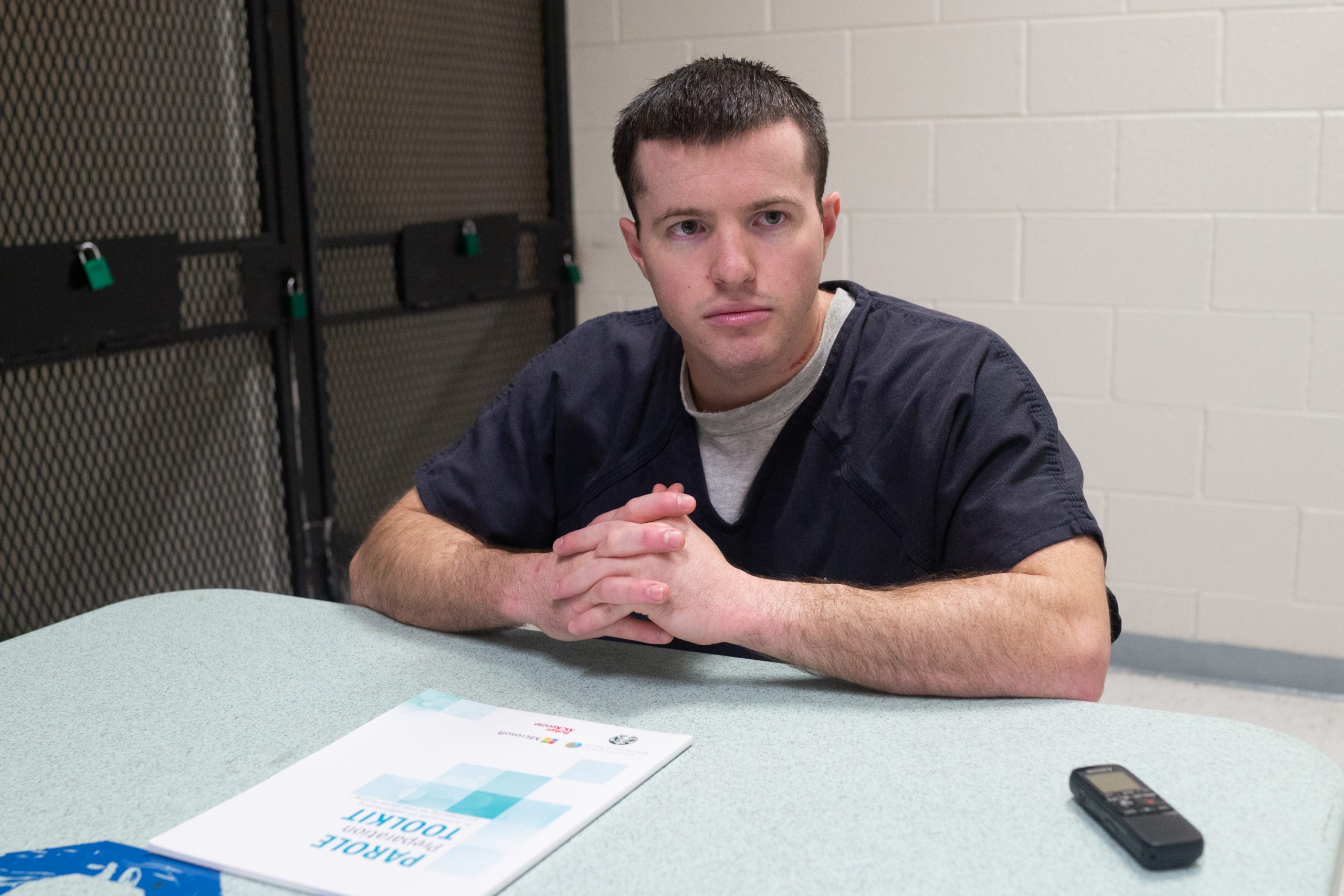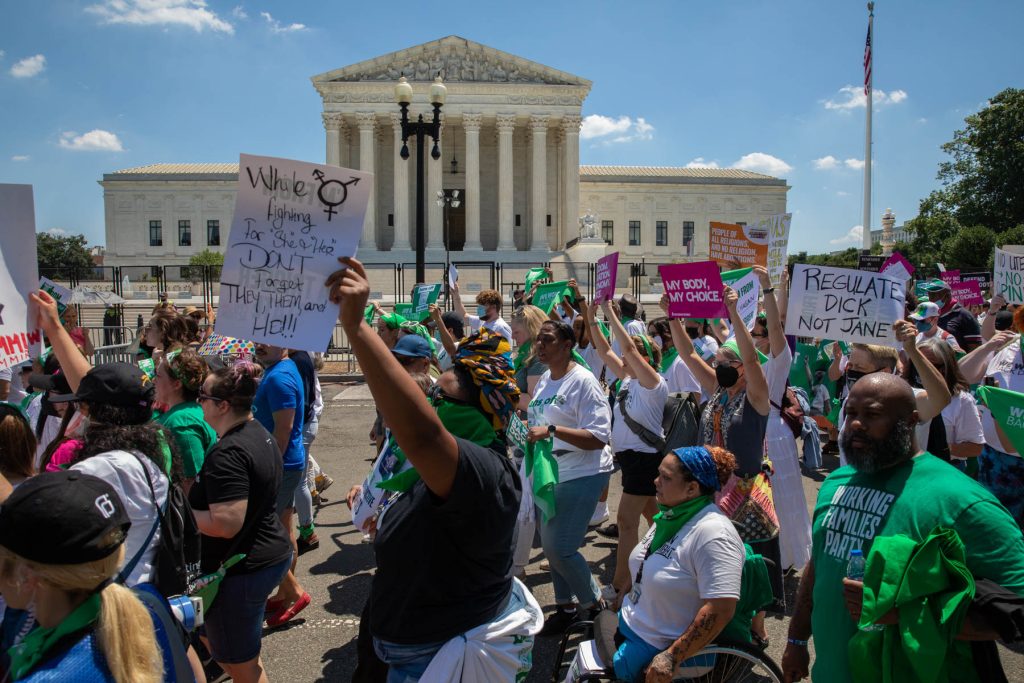The youngest of six children, John Gamble was born in his parents’ bedroom. His sister, Mary, 9 years older than her kid brother, changed his diapers and helped potty-train him. He was allergic to milk, so he had his Cheerios with apple juice instead.
The family lived across the street from a city park in Carlsbad, where Mary would take John to play on the swings and the merry-go-round. As he grew older, he became an avid sportsman: football, baseball, tennis, gymnastics. “It wasn’t unusual to see him on the front page of the newspaper for one sport or another,” Mary said. When he was 12 years old, his face peered out from behind a football helmet on page one of the Carlsbad Current-Argus — he was the quarterback for the Spartans, a local youth team.
Several years later, John was on the front page for a different reason — at 16, he killed a friend. A jury found him guilty of first-degree murder, and a judge sent him to prison for 60 years.
“What I did was horrible,” Gamble, now 27, said in an interview at the Lea County Correctional Facility in Hobbs. He sat at a large plastic table at the end of a narrow room, a guard standing watch. “There’s no making up for it.”
If New Mexico law stays the same, he will live out at least the next four decades of his life in prison. Gamble is one of about three dozen New Mexicans currently incarcerated for 30 years or more for crimes they committed under the age of 18, according to a Searchlight review.
But state Sen. Bill O’Neill (D-Bernalillo) is working on new legislation to give people like Gamble — who are serving long adult sentences for crimes they committed as children — another chance at life outside of prison. O’Neill is still crafting the bill, but his goal is to provide an earlier opportunity for a parole hearing for those inmates. He will speak on a panel addressing the ideas behind the bill at an interim committee hearing on Oct. 9.
“There’s always the chance for rehabilitation,” O’Neill said. He stressed that this wouldn’t be a “free ticket out of jail” — as always, the parole board could deny release if it decides the inmate isn’t ready to re-enter society. O’Neill said he is particularly sensitive to the families of the victims of these crimes and is committed to working with them through the process.
The potential legislative change rests on a growing body of science showing that young brains are not fully developed — and, by implication, that children should be held to a different standard than adults. That science already has convinced the U.S. Supreme Court that children deserve more leniency and has influenced sentencing laws across the country.
“Children are better than the worst thing that they’ve done,” said Denali Wilson, a third-year student at the University of New Mexico School of Law, who is collaborating with lawyers, academics, and advocates on behalf of children who’ve been given long adult sentences. She’s also been working with Gamble’s family and the relatives of other inmates. “No one deserves to be irrevocably judged on their place in society based on their adolescence.”
Thousands of men and women across the country are serving life sentences, or sentences of 50 years or more, for something they did as children, according to The Sentencing Project, a Washington, D.C.-based organization that advocates for criminal justice reform. At the end of 2016, the number stood at about 12,000.
Scientists agree that young people are more able to change than adults, but each case is unique. In New Mexico, many of the children serving long adult sentences were convicted of murder. Yet little research has been done on children who kill. For that reason, “it’s hard to say how at-risk they are, or how treatable they are,” said Kent Kiehl, a professor of psychology, neuroscience, and law at UNM who has studied prisoners.
Linda Atkinson, executive director of the New Mexico Victims’ Rights Project, said it’s important for victims and their families to be part of the discussion about a policy change. “They had a loved one killed or maimed,” she said. “They are directly involved.”
Last month in Albuquerque, to prepare for the Oct. 9 hearing, the American Civil Liberties Union of New Mexico ran a workshop for the families of prisoners incarcerated for crimes committed as juveniles. Mary Cross, Gamble’s older sister, flew in from Houston. She said she would like to tell lawmakers about what she sees as her brother’s growth over the past decade — his generosity, leadership, and academic accomplishments. He graduated from a seminary training program in 2017. He mentors fellow inmates. He plays guitar in a Christian worship band.
“Yes, they’re serving time, but they’re people,” Cross said of inmates like her brother. “They have the capacity to change. Why not help them be beneficial members of society?”
Some states expanding juvenile courts
The U.S. is unique among nations for its focus on incarceration, locking away just over 2 million adults in prisons and jails, more than any other country, according to the World Prison Brief, a database run by the University of London. According to the data, the U.S. incarceration rate is about twice that of Russia and five times China’s. The practice of sending children to adult prisons for the rest of their lives is unique to this country, according to The Sentencing Project.
For many young people who commit heinous crimes in New Mexico, there are therapeutic alternatives to adult prison. Depending on the crime, the child can be tried in juvenile court, with different rules and more leniency than the adult system. The court can turn a child over to the custody of Children, Youth and Families Department, which runs juvenile detention centers. Those facilities are supposed to provide medical treatment and counseling to help children who acted violently develop into better-behaved adults.
But some children don’t get to benefit from the juvenile system. Because Gamble was charged with first-degree murder, he was tried as an adult. That’s the law in New Mexico.
“When you see the conviction for first-degree for a juvenile,” said Dianna Luce, district attorney for the Fifth Judicial District, it means the young person has “truly done something that is thought-out, that is just horrific and sends fear throughout our community.”
The details of Gamble’s crime are brutal.
One night in 2008, when he was 16, he got into a fight with a friend. The two had previously broken into a school together, and Gamble suspected that his friend had ratted him out to the police. Gamble punched him repeatedly, kneed him in the head, and hit him with a rifle, according to court records. When the friend, 15, stopped moving, Gamble doused the body with gasoline and set it on fire.
At the beginning of his 60-year sentence, he spent nearly a year and a half in solitary confinement, locked in his cell 23 hours a day — and when he went outside, he said, he was confined to a private cage. A New Mexico Department of Corrections spokesperson said that Gamble was separated from the general prison population for his own safety.
Whether such long sentences make sense for children, even those who commit terribly violent acts, has been challenged by recent scientific developments. Advanced imaging techniques allow researchers to “look, almost voyeuristically, under the hood of the teenage brain,” said BJ Casey, a psychology professor at Yale University. What researchers are finding confirms common wisdom: In many cases, younger people are more impulsive and tend to think less about future consequences than adults. They’re often easily influenced by peers and highly susceptible to emotions.
As the brain grows, people are better able to make rational decisions. In a recent article, Casey wrote that the brain keeps developing past age 20, which further calls into question the practice of doling out adult punishments to teenagers.
Pinpointing the moment at which the change occurs is tricky, however. Casey has done research in cognitive neuroscience for 25 years. Yet it’s still “very hard for me to say that there’s a time point at which the brain is mature, or at adult levels,” she said in an interview.
In light of the changes in scientific thinking, some states have made an effort to broaden the purview of juvenile courts beyond what’s typically considered childhood. Vermont recently expanded the jurisdiction of children’s courts to cover anyone under the age of 19 unless they are charged with one or more of a dozen violent crimes, like murder, kidnapping, and sexual assault; the change goes into effect next year and the age increases to 20 in 2022. Similar bills have been introduced in Arizona, Connecticut, Illinois, and Massachusetts.
At a national level, the Supreme Court has used the latest science to justify limiting situations where youths receive adult sentences.
In 2010, the Court ruled that children convicted of crimes other than homicide could not be sent to prison for the rest of their lives. In 2012, it set strict limits on when judges can hand out life sentences without parole to children who commit murder. And in 2016, it ruled that the 2012 decision applied retroactively.
“They’ve revolutionized sentencing,” said Marsha Levick, co-founder and chief legal officer at the Juvenile Law Center, a Philadelphia nonprofit law firm that advocates for children.
“The court said, we know you committed murder, but you who committed this murder under the age of 18 are entitled to a second chance,” Levick said. “You are entitled to demonstrate growth and maturity and rehabilitation. You’re entitled to a chance at redemption.”
These legal developments have had little impact in New Mexico. That’s because, in many ways, the state was already ahead of the curve.
In 1975, New Mexico banned the death penalty for juveniles. It wasn’t until 2005 that the U.S. Supreme Court outlawed the practice around the country.
And in 1993, New Mexico set a high bar for sending juveniles to adult prison. Even children who commit certain violent crimes — second-degree murder, kidnapping and robbery — can only be sent to adult prison if the state demonstrates they cannot be treated therapeutically. Only youths who commit first-degree murder can receive a life sentence. In New Mexico, a life sentence means 30 years in prison, followed by parole hearings every two years.
Because Gamble didn’t get a “life” sentence, he is not eligible for parole after 30 years.
While New Mexico’s laws are relatively lenient, there are at least 87 men and women currently incarcerated in adult prisons with sentences of 10 years or more for crimes they committed as children, according to a Searchlight analysis of court documents, state data and information provided by Wilson, the UNM law student. That includes 39 people serving a sentence of 30 years or more, many of whom could remain in prison for the rest of their lives.
“No making up for it”
Gamble had a troublesome childhood. He recalled harsh discipline, including being spanked by his father for sitting down in church when he was supposed to be standing up. He smoked his first cigarette when he was 7 or 8, encouraged by older friends. Eventually, he turned to alcohol, pills, and cocaine.
Addiction took hold of him, and he started stealing for money to buy drugs, he said. He robbed his own family and his friends. He was in and out of his parents’ home. At night, he wandered through parking lots, looking for unlocked cars to burglarize. He attended a few court-ordered classes, where he watched videos of babies born addicted to drugs, but he didn’t change his behavior, he said.
In prison, Gamble is trying to set himself on a better path. He found solace in the words of the Bible and he recently started facilitating Christian discussion groups. He also expresses his faith through music. With his sister, Mary, he has filed for copyright on lyrics of 54 original songs. In them, Gamble describes his feelings about his crime and his life in the years since.
One of his songs, “Confessions,” includes these lyrics:
I confess that it’s my fault I’m guilty of all my crimes
last words to the hangman please tell ’em I apologize.
Reflecting on his situation, he said that he doesn’t know how to meaningfully apologize for killing his friend. “For the things I’ve done, there’s no making up for it,” Gamble said.
He said he wants to get out of prison and if he does, he will try to make the best of his life by helping others. But in the end, there’s nothing he can do, he said, to be worthy of such a future.
“No matter what I do with my life, no matter how much good I do, it’s never going to bring me to a point where I deserve a second chance.”



















